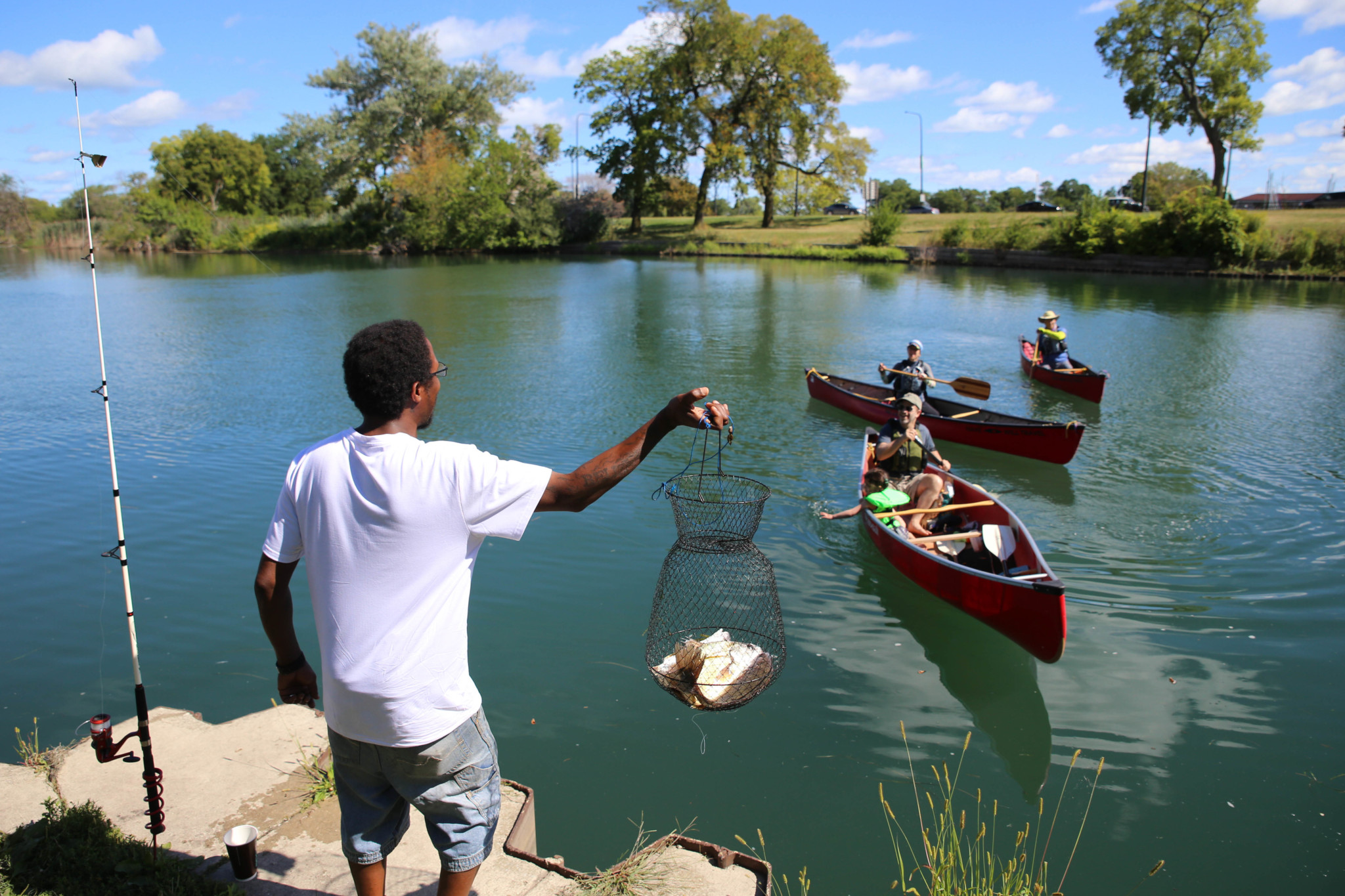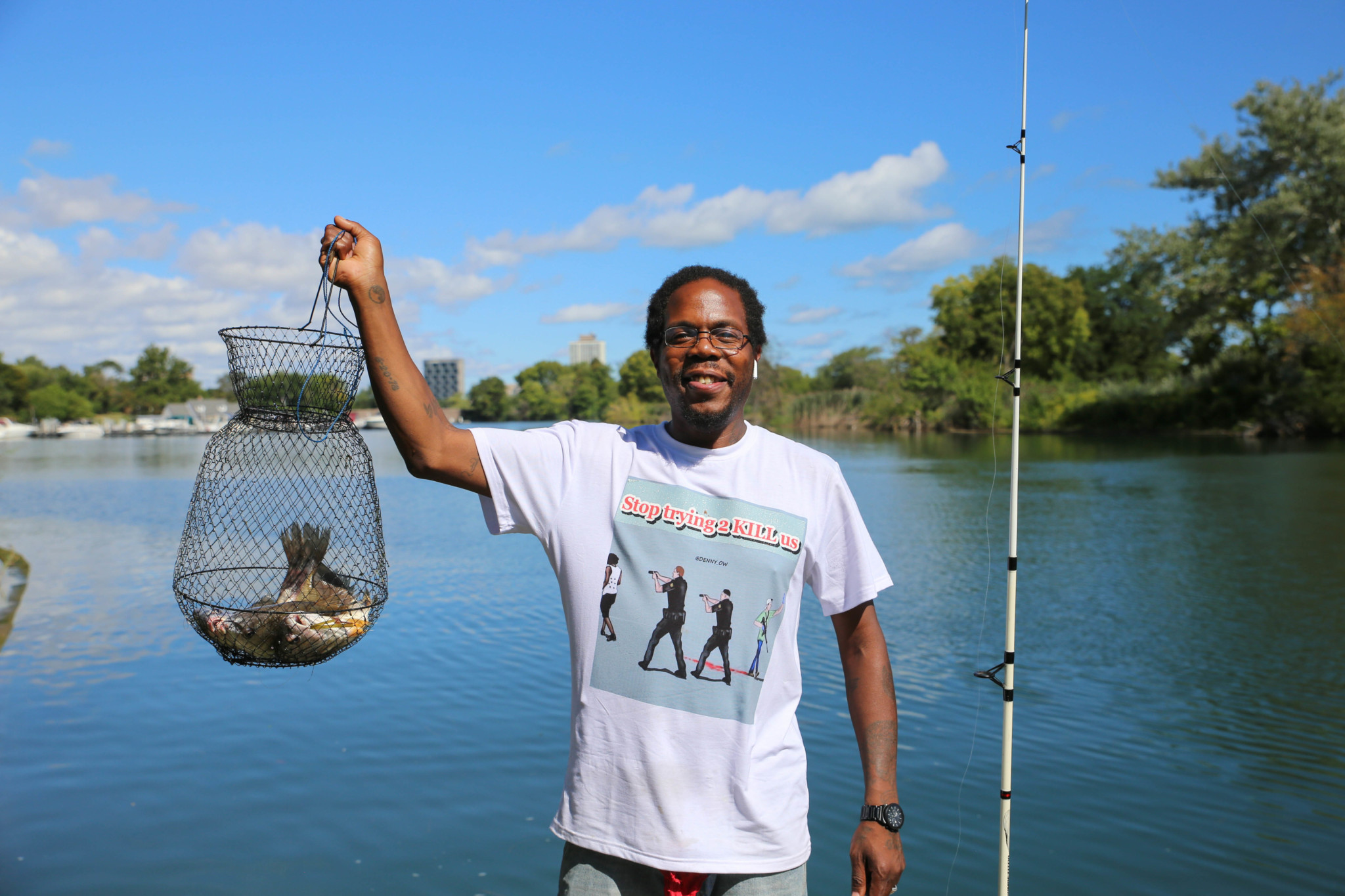
Fishermen old and young gather summer mornings and afternoons in the Jackson Park harbor near La Rabida Children’s Hospital. Further south, others fish Lake Michigan around Calumet Beach. They fish for smelt, steelheads, crappies, and salmon, all stocked by the Illinois Department of Resources (DNR) with varying frequency. A DNR fishing permit is required to fish anywhere in Illinois.
I spoke to fishermen in both locations in August, once approaching them as they fished and once after Wayne Hankins generously invited me to a barbecue. In my conversations, I learned that three of the Jackson Park fisherman learned the craft from their fathers, southern anglers who moved to Chicago during the Great Migration. They have in turn come to understand the migration of fish, describing the seasonal procession of salmon in great detail. Their stories show fishing as an escape from the city, but also an activity shaped by the city’s ecological and political changes. Willie Duncan, who had been fishing for more than sixty years—in Vietnam, Okinawa, Thailand, and Jackson Park—said, “If there’s one thing a person should know, it’s that fish were here before man, and they’ll be here when man is gone.” In Chicago, Hankins—his friend—described fishing as “trying to hold on to what’s left.” The following are four interviews with South Side fisherman, edited and arranged for clarity.
Wayne Hankins
Wayne Hankins has been fishing all of his life on the South Side, having learned the craft from his father, Chicago boxer Wayne Hankins Sr. He now directs a YouTube series called Salmon Nightmares, which recounts fishing stories from fisherman friends. His incredible remix of Old Town Road, Kooler in the Back, is about salmon season in Chicago. He invites people interested in fishing to email him at tutfishing67@gmail.com.
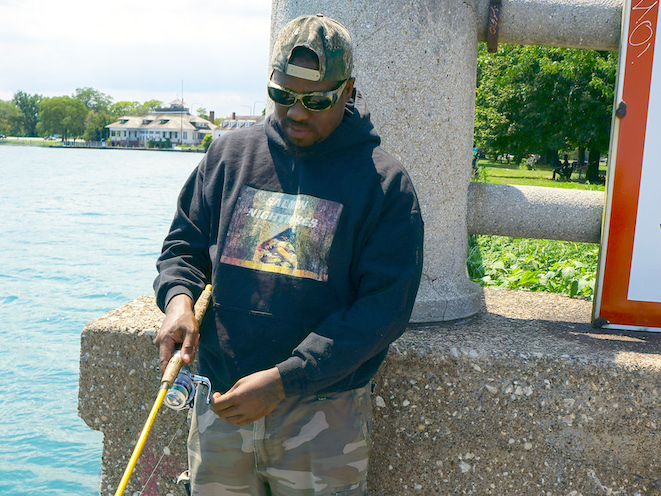
I grew up in a pretty tough neighborhood, Woodlawn. I remember one guy, one of my friends, got killed in the neighborhood. I was out spending the night with the [fishermen], and they were just telling me, “Stay out man, you ain’t gotta go back over there.” And I didn’t want to ‘cause everybody was crying. It was sad. So that’s when my deep passion for fishing really hit me, like, you know, I could be somewhere peaceful. There’s guys over there crying and loading guns and selling drugs and I’m up here catching salmon and having the time of my life. So it separated me from that and from then on out I just always been an angler.
And then I’m an Aquarius, which is a water sign, so I think I have a natural love for water. You learn to fish, you almost become a fish outside the water. I feel like a fish out of water. I talk to them, and fish for them, and watch them turn. I know when the water’s hot, when it’s cold, what lures they like when the clouds are out, what lures they like when the sun is shining. I’ve been downtown fishing and didn’t even take a fishing pole, found line and string and a hook, and fished with my hands and caught fish. [Chicago] is one of the best fishing spots, I believe, in the world.
The lake is pretty much like a fish market when the salmon come around, because it’s not too many places in an urban city where you can just catch salmon left and right. A lot of Polish guys, Mexican guys [come out to buy] salmon, for ceviche, caviar. I know one lady that, anything salmon, she get it because she got glaucoma.
I started filming [a web show called] Salmon Nightmares in 2019. Me and my best friend, we would come out fishing later at night. A lot of guys couldn’t fish at night because they work. They’d be sleeping while we be out catching monster salmon and they wake up and they be all mad and looking crazy and be like, “Where you guys get these fish?” Fishing will sometimes give you nightmares, because guys be out fishing and you have a fish hooked on for hours straight, and all of a sudden your lines snap and you lose it. It becomes a nightmare because you go home and think about it, hour after hour, night after night.
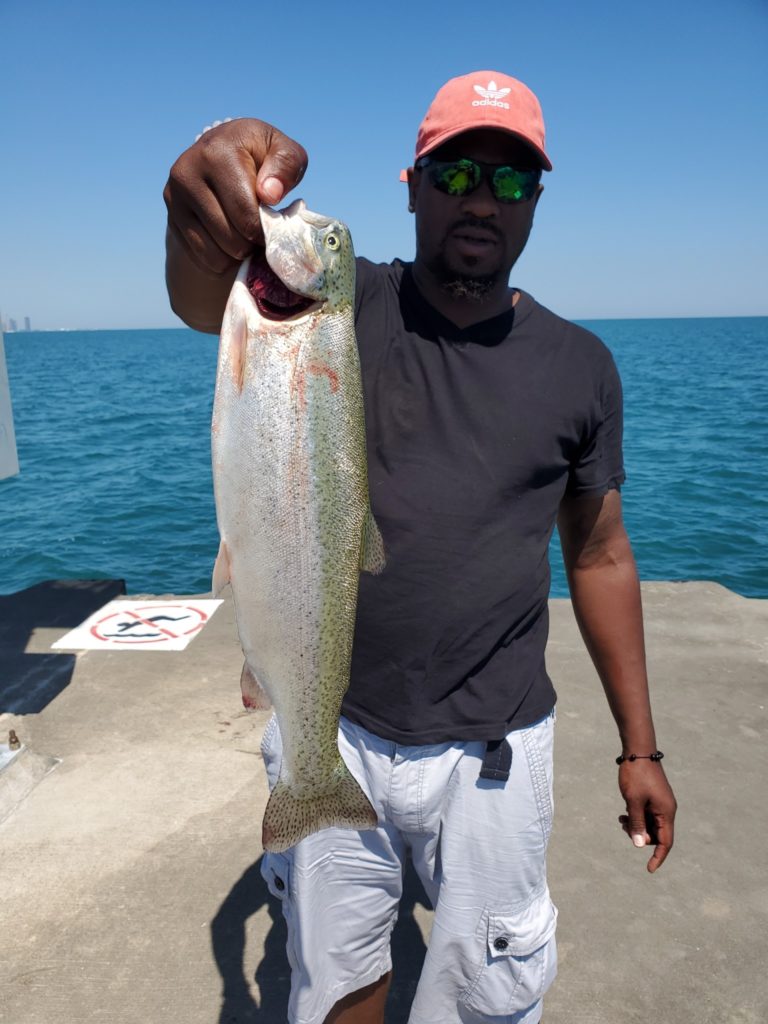
I just try to film all the guys because they’re getting older, you know, most of my friends are in their late fifties, sixties, seventies, even eighties. I grew up learning to fish with these guys and that’s my way of paying homage back to them, recording, and giving them their flowers while they’re here.
[Wayne’s friend Willie Duncan approaches and eventually starts talking to us about the shortage of fish in the parks. Duncan is a Vietnam War veteran who lived all over Asia before returning home to Chicago. He has fished in Vietnam, Thailand, Japan, and the South Side of Chicago.]
Willie Duncan: They stock nothing but salmon, coho, they don’t stock bluegill, they don’t stock catfish, they don’t stock no bass. That’s not being stocked.
WH: What’s the mayor’s name, who used to advocate fishing? Daley. The dad. They say he used to stock up, but when he got out of office, they lost the love for it.
WD: They even stopped stocking the parks. Matter of fact, we supposed to have three [fish stockings], but we only had one this year. [Ed. note: It is not clear how often the lagoon is stocked.] And the money is allocated, but I don’t know what they’re doing with it. I don’t understand. The city got that money but all I see is new trucks.
WH: We from Chicago, the land of crooks. From Al Capone on down, they don’t do the proper things they should. Why isn’t fishing stocked when you got kids [who] can come fishing?
WD: They actually trying to turn this into a golf course. They gon’ take away this fishing. [Ed. note: The Jackson Park Golf Alliance says the proposed golf course should not cut off fishing access.] And we pay taxes.
WH: September there be two, three hundred guys out here.
WD: How’s our taxes being spent if we don’t get nothing for it?
WH: We not just fishing to be fishing, we fishing to hold on to what’s left as well.
WD: When your kids get of age, probably won’t be none of this. Just parties, bars, and ride a Ski-Doo. They forget about people who like to fish.
Just the experience, to catch a fish, there’s something to it. Them fish I was showing you had me laying on the ground. You gotta be out here when we catching salmon. That’s a thrill. Aw man, you will see something.
[I’ve been fishing with all of these guys] since they was kids. Since they was shorties, they were watching me fish. I watched a whole lot of ‘em grow up on this lake. It’s like a family. Everybody out here basically knows each other. And they growed up right here on this lake. We’ve been seeing each other for forty years, longer than that.
I don’t care how bad and evil it is, but if you put a pole in [someone’s] hand, you’ll have a different person. Fishing is therapy. Meditation. I suffer from PTSD, and I go to my group and I tell them about it. If I want to calm down, I go fishing. I don’t care if I catch another fish. Just sit there and watch that water, and relax my mind, just relax. If there’s one thing a person should know, it’s that fish were here before man, and they’ll be here when man is gone.
José Villeros
José Villeros grew up near the steel mills on the Southeast Side, and fishes with his son and wife. He and his neighbors call themselves the Buffalonians.
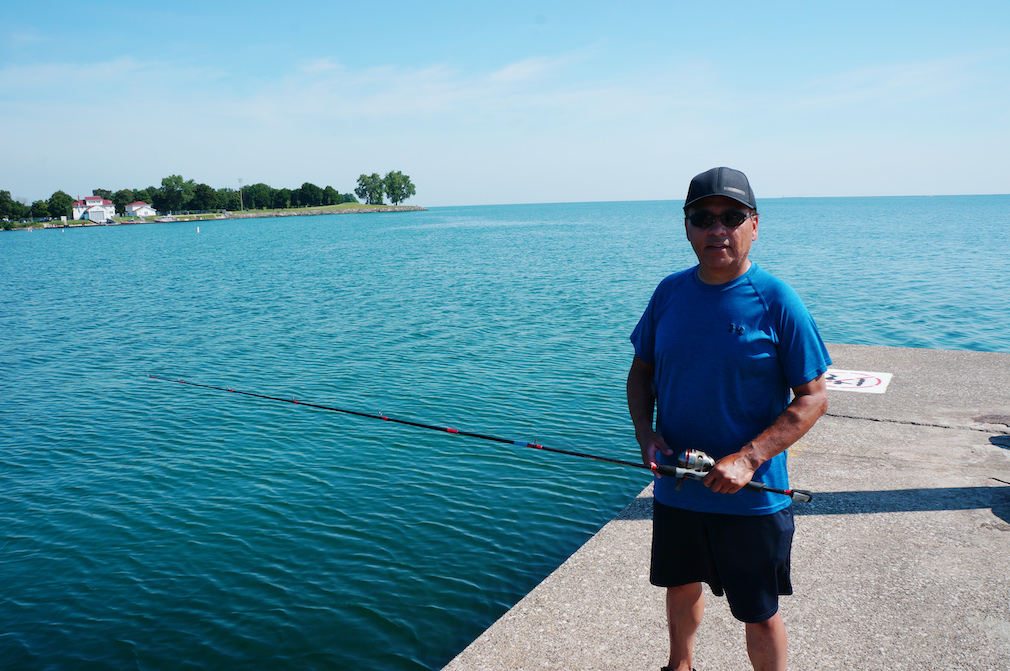
I started fishing out on this local area of the pier. I grew up on 87th and Buffalo, not too far from here. So I started fishing here at about ten, and we were using bamboo sticks at the time. I’m talking about the early seventies, this whole place was filled with people, this pier, the rocks, all that was fishing. At that time, you know, we were kids, we didn’t have money, so we basically took sticks from local trees and some of us found bamboo sticks that were left on the north side [of the beach] from the older guys, the steel mill guys.
[At first] when my friends said, “Hey let’s go fish”, I didn’t know what it meant. I knew what fish were, but I didn’t know what “go fishing” meant. I asked one of the kids and he says, “Yeah, you take a rod, you need this, you need that,” and as soon as he kept saying you need a rod, I started eliminating myself, because you’re poor, you’re living in a neighborhood, it’s just, you’re underprivileged in a sense of income. But my parents come from the mountains of Mexico and they taught us, you need to think ahead. We ended up walking the alleys of our neighborhood looking for glass bottles, Cokes. We would go into the local store and trade [them] in. Then one of the parents would take us to buy our fishing poles.
The neighborhood kids saw us with all this fish and the smiles on our faces and our stories, so the next time we went out it was a whole scene of bikes. So yeah, I mean it actually brought a lot of kids together, even other kids from other neighborhoods. We were a very close community and we all went in each others’ homes. Everybody ate breakfast together, we had lunch, we had dinner, we watched movies in our neighborhood.
Some of these kids were a lot worse off than we were. Because only one parent might have worked, like a father, he actually worked the steel mill, but was an alcoholic, was abusive, and the mother was also visiting the local bars. There was quite a handful of those types of families, so these kids really were looking for a way out, or safety, or to forget about this for now, you know. I think having them out here sitting there and them not even saying a word, just watching the water, daydreaming, it helped them tremendously. When you’re fishing you’re focused and a lot of times looking at the waves of the water, the color of water, and you look at that sometimes….It just catches your attention.
Going into the homes and watching them, when the mills closed in the eighties, watching the alcoholism get worse, watching parents drinking more, getting more violent, and committing suicide….The community just started to split up. We started to see very few people out here fishing. Here, especially along the north end of the beach, the rocks, that was always filled. People were camping out just to have a spot over there. There’s also less fish, because this has been fished for a very long time. We’ve been fishing for years but we haven’t fished here in a long time.
Dwayne Burnett
Dwayne Burnett was fishing in Jackson Park with three of his friends, all taking advantage of a day off from work at the Jesse Brown VA hospital. His father taught him fishing, and he taught his daughter and grandson fishing. Many times his fishing pole shook, sounding a little bell, though he didn’t catch anything while I was around.
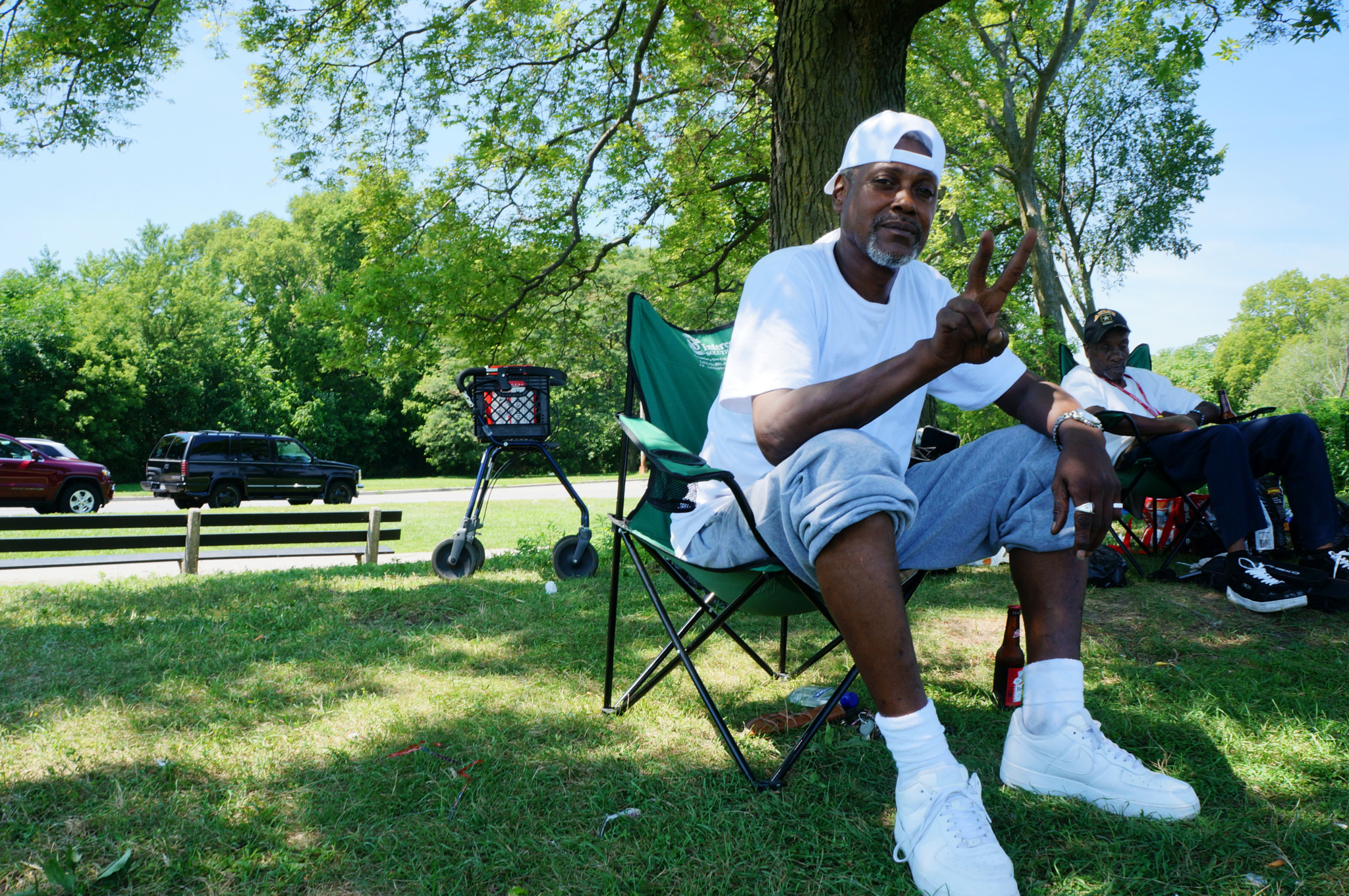
I was born in Chicago, but I learned fishing from my pops. Most of the time me and my pops was together, we was either fishing or we was on the road going down South, and when we got down to Greenwood, Mississippi, we still went fishing. My pops from the South. When he was born he was a cotton picker, back in the twenties. Rest his soul, he’s not here with us no more. He drove a cab and did the best he could do, my mom too.
The first fish I caught was a bluegill, and my father told me I had a big-mouthed bass. And I started running around as a little kid saying, “I caught a big-mouthed bass.” And from that point on, I just been addicted to fishing. All my life, I enjoyed fishing.
These fishes migrate through here every season, and you can tell when the season is changing because these certain fishes will be gone. When the salmon come through here, they come through eating the fish we’re catching. It’s a nice fight, it’s a real thrill to try to pull it in. They so strong! There’s a feeling that you get. It’s a beautiful feeling. It’s not as good as sex, but it’s a thrill.
My best fishing story happened some years ago. We had had a heavy, heavy, heavy snow that winter and when the snow started melting away it overran into the lagoon in Washington Park. [Addressing his friend] Dona, do you remember that one? When you put your big old boot on and walk out onto the regular roads in the lagoon, and the water had come all the way out almost to Hayes Drive and fishes was just swimming everywhere? You had you a milk crate, or a bucket, and could just scoop ‘em up if you wanted to! It was carp. We was selling them to the Chinese restaurants.
But even if you don’t catch no fish, it’s just to get away from the city and pretend [laughter]—pretend we somewhere away from [here, but] before you know it, you back in the world again. The riots, tearing up all the stores. Why? What did it gain? What did you get from it? I know they going around with the Black Lives Matter thing—that’s real decent. I hope things do change, but as far as violence and fighting with the police, I don’t wanna get involved in none of that.
[But] that’s one thing that the pandemic has done, and I’ve noticed what the protest has done…like us, sitting right here, and we got us a Budweiser, right? At one time, we would go up north, to Jefferson Park or somewhere up there, right, and sit along the parks with a cooler, beers. White people, no problem! Police ride through, no problem! Me, sitting here, with a Budweiser, and the police ride past there like now and don’t say nothing—ha! That’s amazing. No way in the world we would be able to sit here and have this bottle without cuffing it and sneaking. That I have noticed is a big change.
Sometimes we actually bring our family out here, have a small little grill. We might come out here like twice a month. They farm-raise fish that they put in lagoons in certain areas. I don’t know if Ms. Lightfoot is as good as the Daleys with stocking the parks. Every holiday, Fathers’ Day [the Daleys] would stock ‘em up. The first stocking was…[suddenly a fish pulls on his line].
Okay! I thought I felt you! Come on, do it again! Teasing me huh? You didn’t get that? I was on it boy! I was on it, Jack! I didn’t even have to hear the bell ring, I seen it when it dropped! Yeah, they smart today. They smart. They smart. They smart!
Morley Musick is a writer and reporter from Chicago. He founded Mouse Magazine with friends in 2019 and posts short essays on his blog. He last wrote for the Weekly about vacancies in CHA housing.

